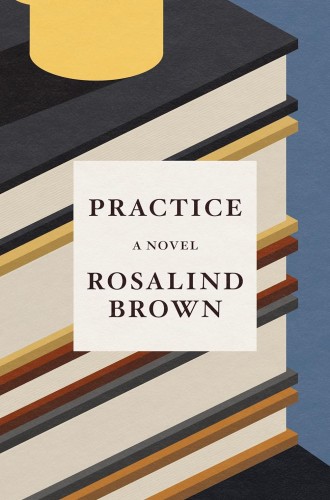A novel about (not) writing an essay
Rosalind Brown’s debut novel could be understood as a midrash on Montaigne’s metaphor of the mind as runaway horse.

Practice
A Novel
In a famous essay about retiring to his family’s estate in hopes of writing, Michel de Montaigne compares his mind to a runaway horse: “Determined to devote myself as far as I could to spending what little life I have left quietly and privately; it seemed to me then that the greatest favour I could do for my mind was to leave it in total idleness, caring for itself, concerned only with itself, calmly thinking of itself.” But instead of the calm that he sought, Montaigne found that his mind “bolted off like a runaway horse, taking far more trouble over itself than it ever did over anyone else; it gives birth to so many chimeras and fantastic monstrosities, one after another, without order or fitness” that he decided to let it run.
Rosalind Brown’s debut novel could be understood as a midrash on Montaigne’s metaphor. Annabel, a 21-year-old student at Oxford, wakes up on a Sunday morning with the intention of spending a solitary day writing an essay on Shakespeare’s sonnets that is due on Tuesday. She does everything she knows how to do to keep her mind clear and focused on the task at hand. She drinks peppermint tea instead of coffee. She has all of her books and notes and annotated sonnets ready at hand. But the mind and body do not obey. By the end of the day—the novel takes place in a single period of waking to bedtime—the essay has not been written and her mind has not really given the sonnets much space.
Read our latest issue or browse back issues.
I’m sorry to have introduced that spoiler, but this novel is not for the plot-driven reader. We watch Annabel make tea, prepare lunch, and go for a walk. The action, like in Montaigne’s essay, is all inside Annabel’s disciplined practice and runaway mind.
Because of this, the pleasures of reading are pleasures of contemplation rather than action, and they are intense. In each sentence, we slow down to experience the physical world around Annabel, even if nothing happens while we are experiencing that. “The dark lawn stretches away towards the flowerbeds. The two huge bare trees proclaim their knowledge of the night. This is her favourite place in the college, here in the archway: a place from which to see the garden, to regard it, to step into it.” But she doesn’t. Instead her mind is off and running again, into memory and imagination, one more sequence in which no writing is done.
The novel surprised me with the intricate relationship between mind and body that develops over its 200 pages. If I were to tell you that this novel is about reading, you would probably not imagine the role that the physical experience of reading and writing plays for Annabel. This is a body reading and writing, not only a mind. That is a rare and precious intervention in British literature. Annabel experiences hunger and food, longing for caffeine and relief (some of the most luscious passages are devoted to the pleasures of coffee), stiffness, sexual desire, and even bodily functions such as peeing and pooping. Her mental chimeras track to the purely fantastical with invented characters and scenarios, to sex with her own possible boyfriend, to imagining the lives and pursuits of others.
At times this intimacy with another person’s mind and body feels suffocating. “Just talk to anybody!” I found myself pleading with Annabel after about 50 pages. But the novel does take off in unexpected directions, even within the constraints Brown has set. The sensation of suffocation was a sign of how well I was reading, just as my experience of relief when Annabel does go out into the world was a sign of Brown’s success at taking me inside her experience. A metatext becomes visible. As Annabel meditates on colons in the sonnets, colons appear inside her mind and in the text. I know it sounds almost ridiculous, but the effect is entertaining, even delightful.
The title of the novel is Practice, and many forms of practice are depicted. There is an academic practice that aims to fulfill an assignment. There are myriad physical practices aimed at keeping the body in a condition in which it can participate in academic practice. And then there is the practice of living a life. At one moment during the day, Annabel’s mind drifts into longing to already have read all of Shakespeare. She imagines a different routine for her day, one in which she would get up and “read one Shakespeare, and then a walk twice round the meadow whatever the weather, and then back for a coffee and settling into her actual work. . . . Say she started tomorrow—six days a week for another five weeks—she could just about not quite read them all before the end of term.” But then she notices this particular pattern of her mind: to always imagine a new and better practice than the one that she has developed. “Trying to perfect her routine even further, to get even more out of each day. Like the way she used to rearrange the furniture in her bedroom at home, expecting the room suddenly to transcend its own limitations.”
This strange, delightful novel reminded me often of Virginia Woolf’s explorations of consciousness. Brown helps us understand the limitations of the mind and body—not only those of a young woman trying to write an essay, but also our own, in whatever practice we’ve inhabited.






